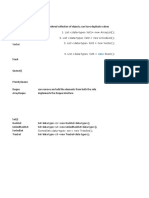0 ratings0% found this document useful (0 votes)
60 viewsJava Collection Matrix
There are several commonly used Java collection classes for different purposes. ArrayList is the default list implementation for storing elements where insertion order and duplicates matter. HashMap is the default map and used for simple caching where keys must be unique. HashSet provides a set that does not allow duplicates or ordering. BlockingQueue implementations like ArrayBlockingQueue and LinkedBlockingQueue support producer-consumer scenarios. Thread-safe variants like ConcurrentHashMap provide concurrent access without external synchronization.
Uploaded by
Jessica HarveyCopyright
© © All Rights Reserved
Available Formats
Download as PDF, TXT or read online on Scribd
0 ratings0% found this document useful (0 votes)
60 viewsJava Collection Matrix
There are several commonly used Java collection classes for different purposes. ArrayList is the default list implementation for storing elements where insertion order and duplicates matter. HashMap is the default map and used for simple caching where keys must be unique. HashSet provides a set that does not allow duplicates or ordering. BlockingQueue implementations like ArrayBlockingQueue and LinkedBlockingQueue support producer-consumer scenarios. Thread-safe variants like ConcurrentHashMap provide concurrent access without external synchronization.
Uploaded by
Jessica HarveyCopyright
© © All Rights Reserved
Available Formats
Download as PDF, TXT or read online on Scribd
You are on page 1/ 1
Most Commonly Known Collections
ArrayList YES YES NO YES YES NO NO NO
* Default choice of List implementation
* To store a bunch of things
* Repetitions matters
* Insertion order matters
* Best implementation in case of huge lists which are read intensive
(elements are accessed more frequently than inserted deleted)
HashMap NO YES YES NO YES NO NO NO
* Default choice of Map implementation
* Majorly used for simple in-memory caching purpose.
Vector YES YES NO YES YES YES NO NO
* Historical implementation of List
* A good choice for thread-safe implementation
Hashtable NO YES YES NO NO YES NO NO
* Similar to HashMap
* Do not allow null values or keys
* Entire map is locked for thread safety
Most Talked About Collections
HashSet NO YES NO NO YES NO NO NO
* To store bunch of things
* A very nice alternative for ArrayList if
** Do not want repetitions
** Ordering does not matter
TreeSet YES YES NO NO NO NO NO NO
* To store bunch of things in sorted order
* A very nice alternative for ArrayList if
** Do not want repetitions
** Sorted order
LinkedList YES NO NO YES YES NO NO NO
* Sequential Access
* Faster adding and deleting of elements
* Slightly more memory than ArrayList
* Add/Remove elements from both ends of the queue
* Best alternative in case of huge lists which are more write intensive
(elements added / deleted are more frequent than reading elements)
ArrayDeque YES YES NO YES NO NO NO NO
* Random Access
* Faster searching and retrieval of elements
* Add/Remove elements from both ends of the queue
* Best alternative in case of huge lists which are more read intensive
Stack YES NO NO YES YES YES NO NO
* Similar to a Vector
* Last-In-First-Out implementation
TreeMap YES YES YES NO NO NO NO NO * A very nice alternative for HashMap if sorted keys are important
Special Purpose Collections
WeakHashMap NO YES YES NO YES NO NO NO
* The keys that are not referenced will automatically become eligible for
garbage collection
* Usually used for advanced caching techniques to store huge data and
want to conserve memory
Arrays YES YES NO YES YES NO NO YES
* A Utility class provided to manipulate arrays
** Searching
** Sorting
** Converting to other Collection types such as a List
Properties NO YES YES NO NO YES NO NO
* Properties are exactly same as the Hashtable
* Keys and Values are String
* Can be loaded from a input stream
* Usually used to store application properties and configurations
Thread Safe Collections
CopyOnWriteArrayList YES YES NO YES YES YES NO NO
* A thread safe variant of ArrayList
* Best use for
** Small lists which are read intensive
** requires thread-safety
ConcurrentHashMap NO YES YES NO NO YES NO NO
* A thread safe variant of Hashtable
* Best use for
** requires thread-safety
** Better performance at high load due to a better locking mechanism
ConcurrentSkipListMap YES YES YES NO NO YES NO NO
* A thread safe variant of TreeMap
* Best use for
** requires thread-safety
ConcurrentSkipListSet YES NO NO NO NO YES NO NO
* A thread safe variant of TreeSet
* Best use for
** Do not want repetitions
** Sorted order
** Requires thread-safety
CopyOnWriteArraySet YES YES NO NO YES YES NO NO
* A thread-safe implementation of a Set
* Best use for
** Small lists which are read intensive
** requires thread-safety
** Do not want repetitions
ConcurrentLinkedQueue YES NO NO YES NO YES NO NO
* A thread-safe variant of PriorityQueue
* Best use for
** Small lists
** No random access
** requires thread-safety
ConcurrentLinkedDeque YES NO NO YES NO YES NO NO
"* A thread-safe variant of LinkedList
* Best use for
** Small lists
** No random access
** Insertions, retrieval on both sides of the queue
** requires thread-safety"
Blocking Collections
ArrayBlockingQueue YES NO NO YES NO YES YES YES
* Best use for Producer - Consumer type of scenarios with
** Lower capacity bound
** Predictable capacity
* Has a bounded buffer. Space would be allocated during object creation
LinkedBlockingQueue YES NO NO YES NO YES YES YES
* Best use for Producer - Consumer type of scenarios with
** Large capacity bound
** Unpredictable capacity
* Upper bound is optional
LinkedTransferQueue YES NO NO YES NO YES YES YES
* Can be used in situations where the producers should wait for
consumer to receive elements. e.g. Message Passing
PriorityBlockingQueue YES NO NO YES NO YES YES NO
"* Best use for Producer - Consumer type of scenarios with
** Large capacity bound
** Unpredictable capacity
** Consumer needs elements in sorted order
LinkedBlockingDeque YES NO NO YES NO YES YES YES
* A Deque implementation of LinkedBlockingQueue
** Can add elements at both head and tail
SynchronousQueue YES NO NO YES NO YES YES NO
* Both producer and consumer threads will have to wait for a handoff to
occur.
* If there is no consumer waiting. The element is not added to the
collection.
DelayQueue YES NO NO YES NO YES YES NO
* Similar to a normal LinkedBlockingQueue
* Elements are implementations of Delayed interface
* Consumer will be able to get the element only when it's delay has
expired
Source: http://www.janeve.me/articles/which-java-collection-to-use
Ordering
Random
Access
Key-Value
Pairs
Allows
Duplicates
Allows Null
Values
Thread Safe
Blocking
Operations
Upper
Bounds Usage Scenarios
You might also like
- Attendance RX Network Installation Troubleshooting Guide: Server - Client Communication FailureNo ratings yetAttendance RX Network Installation Troubleshooting Guide: Server - Client Communication Failure2 pages
- Java Collection Matrix - Java Collection MatrixNo ratings yetJava Collection Matrix - Java Collection Matrix1 page
- Java_Note_e8bf4081-0a62-4bd1-8ac3-0266acfadea9No ratings yetJava_Note_e8bf4081-0a62-4bd1-8ac3-0266acfadea946 pages
- Basic Collection Types: Collection Type Functionality Typical UsesNo ratings yetBasic Collection Types: Collection Type Functionality Typical Uses5 pages
- O O O O O O O O O O O: List Interface ArraylistNo ratings yetO O O O O O O O O O O: List Interface Arraylist2 pages
- List List1 New Arraylist 2. List List2 New Linkedlist 3. List List3 New VectorNo ratings yetList List1 New Arraylist 2. List List2 New Linkedlist 3. List List3 New Vector4 pages
- Java Collections and JDK8 Features Complete NotesNo ratings yetJava Collections and JDK8 Features Complete Notes114 pages
- Interview Question Collection Framework PDFNo ratings yetInterview Question Collection Framework PDF13 pages
- A Primer on Quant Strategies - Blueshift® DocsNo ratings yetA Primer on Quant Strategies - Blueshift® Docs9 pages
- Whitepaper SocialNetworking Tyntec 20111201 Final PDFNo ratings yetWhitepaper SocialNetworking Tyntec 20111201 Final PDF4 pages
- JULY 2015 Session: Tentative Schedule of Various Entrance Examinations For The Year of 2015No ratings yetJULY 2015 Session: Tentative Schedule of Various Entrance Examinations For The Year of 20153 pages
- Asterisk With SS7 Via Wanpipe, Dahdi and Libss7 - With ISUP SAM Support - BarryODonovanNo ratings yetAsterisk With SS7 Via Wanpipe, Dahdi and Libss7 - With ISUP SAM Support - BarryODonovan6 pages
- Support Wiki - Manual Installation For TDM Cards Wanpipe For AsteriskNo ratings yetSupport Wiki - Manual Installation For TDM Cards Wanpipe For Asterisk11 pages
- Lesson 3: Processing Data: Transforming Data Into InformationNo ratings yetLesson 3: Processing Data: Transforming Data Into Information21 pages
- What Is The Technology Behind The Web-Based Version of WhatsApp - QuoraNo ratings yetWhat Is The Technology Behind The Web-Based Version of WhatsApp - Quora6 pages
- The 8086 Interrupt Mechanism: The 8259A PICNo ratings yetThe 8086 Interrupt Mechanism: The 8259A PIC14 pages
- CS 306: Introduction: Dr. Ayan Mondal Assistant Professor Dept. of CSE, IIT IndoreNo ratings yetCS 306: Introduction: Dr. Ayan Mondal Assistant Professor Dept. of CSE, IIT Indore28 pages
- BSC Computer Sscience 2021 Syllabus Kerala UniversityNo ratings yetBSC Computer Sscience 2021 Syllabus Kerala University44 pages
- C Project On "Hotel Management": June 2020No ratings yetC Project On "Hotel Management": June 202018 pages
- Create A Calculator App That Can Perform BasicNo ratings yetCreate A Calculator App That Can Perform Basic7 pages
- LT25i Sony Xperia V Software Upgrade Procedure - V1 .1No ratings yetLT25i Sony Xperia V Software Upgrade Procedure - V1 .117 pages
- MCES 18CS44 Unit3 4 LPC 2148 InterfacingNo ratings yetMCES 18CS44 Unit3 4 LPC 2148 Interfacing52 pages
- Curriculam Vitae Passport No J1182256: Career ObjectiveNo ratings yetCurriculam Vitae Passport No J1182256: Career Objective3 pages





































































































